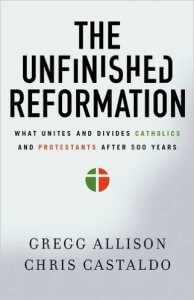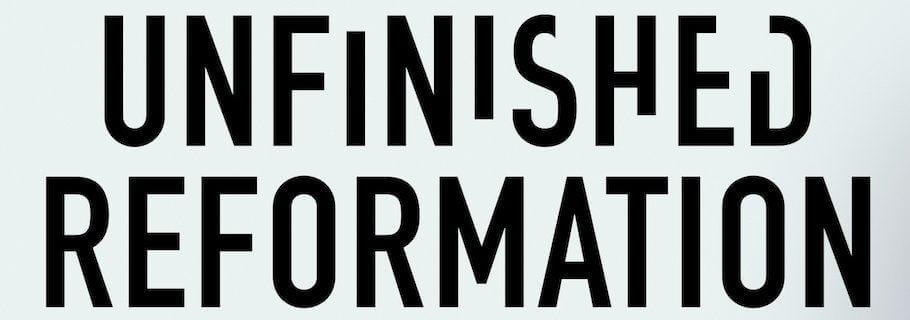Book Review: The Unfinished Reformation: What Unites and Divides Catholics and Protestants After 500 Years by Gregg Allison and Chris Castaldo.

This book is a shorter book looking at where Christianity has come since the Protestant Reformation. It essentially
attempts to provide an overview of what divides or brings Protestants and Catholics and then answer the question, “Is the Reformation finished?”[i] While their answer of “Yes. No. No, but . . .”[ii] (which ultimately is a no) does not feel adequate. It is not wholly satisfying, largely due to the shortness of the book and lack of focus that is placed on the ecumenical workings since Edinburgh 1910 and Vatican II.[iii]
This book sets out on an extremely difficult task of synthesizing Protestant and Catholic doctrine and dogma, determining where they converge, and where they do not. It’s difficult not only because of the 500 years of misunderstandings on both sides, primarily on theology but also due to common language used in different ways, which Allison & Castaldo recognize on their section of the people of God.[iv]
The book is broken up into a brief history, what brings Catholics and Protestants together, and a much larger section of what keeps them apart eventually ending on what that ultimately means for the Reformation. The section on division has four main topics of Mariology, tradition, the sacraments, and salvation; perhaps seeing this is most important as they spent the most time here and rightly so. While tradition, Mariology, and the sacraments continue to be a contentious issue, that perhaps allow for a continued reformation they may not be primary issues, while salvation certainly is.
While they understand the past Catholic declarations and doctrines on justification and salvation, they seem to miss point of Catholic theology. The Catholic Church never recounts what has been previously said but slowly and methodically reform, while still affirming past councils and statements.[v] That is to say they don’t seem to affirm that the Joint Declaration on the Doctrine of Justification has much weight as it really does, nor do they think the anathemas thrown have been rescinded.[vi] In truth, they have not ‘been rescinded’ but that they do not apply to the Common Understanding set out in the Joint Declaration which can be seen as a win for Christian unity on salvation, a deeply central issue.
But I ultimately cannot recommend this book based on their synthesis of Catholic Theology. While almost exclusively using the Roman Catholic Catechism as a source of theology they miss the last 50 years or so of Catholic and Protestant dialogue and the resulting declarations and upholding them in the same light. In all I do think it is worth the read but it seems to fall short of gracefully comparing the Catholic teaching to Protestant teaching. If you wish to check out this book yourself you can find it at Amazon: The Unfinished Reformation: What Unites and Divides Catholics and Protestants After 500 Years
[i] Greg Allison and Chris Castaldo, The Unfinished Reformation: What Unites and Divides Catholics and Protestants After 500 Years (Grand Rapids: Zondervan, 2016) Kindle Edition, 16; 145.
[ii] Allison & Castaldo, The Unfinished Reformation, 145.
[iii] The Edinburgh World Missionary Conference, 1910 and the Second Vatican Council both go into unity within the Christian realm, which ultimately set up a lot of the talks that warranted the convergence of Catholicism and Protestantism.
[iv] Allison & Castaldo, The Unfinished Reformation, 58.
[v] This is mentioned by Anthony Lane in his book (whom they use as a resource), Justification by Faith in Catholic-Protestant Dialogue: An Evangelical Assessment (London: T & T Clark, 2002), 231
[vi] Allison & Castaldo, The Unfinished Reformation, 137 note 3.
